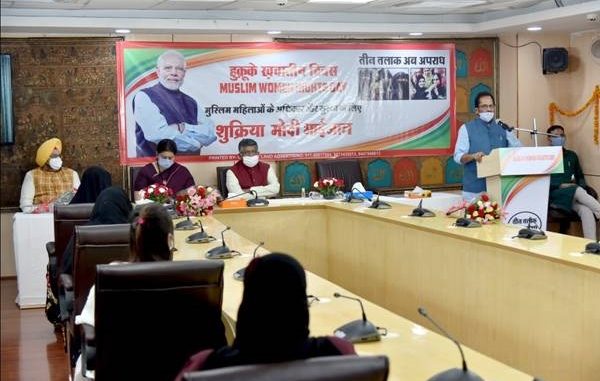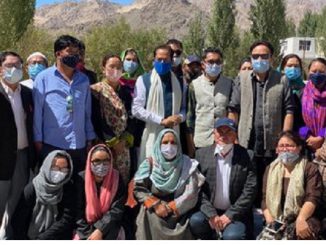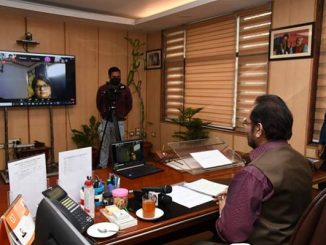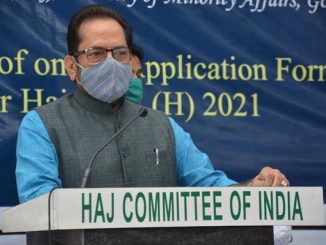
Jul 31: Union Minister for Minority Affairs Shri Mukhtar Abbas Naqvi today said here that commitment of the Government is “Politic Empowerment and not Political Exploitation”. Several “bold and big reforms” are a reflection of our honest and effective efforts which have delivered better results, he said.
Shri Mukhtar Abbas Naqvi was addressing Muslim women from across the country through virtual conference along with Union Law Minister Shri Ravi Shankar Prasad, Union Minister for Women and Child Development Smt Smriti Irani on the occasion of “Muslim Women Rights Day”. Shri Manjit Singh Rai, Vice-Chairperson, National Commission for Minorities was also present at the event.
Shri Naqvi said that “1st August is a day which made Muslim women free from social evil of Triple Talaq; 1st August has been recorded in the country’s history as “Muslim Women Rights Day”. 1st August will remain as a golden moment of Indian democracy and Parliamentary history.”
Shri Naqvi said that the law which makes social evil of Triple Talaq a criminal offence has strengthened “self-reliance, self-respect and self-confidence” of the Muslim women of the country. He said that the Government has ensured gender equality and strengthened constitutional, fundamental and democratic rights of the Muslim women by bringing law against the cruel social evil of Triple Talaq.
Shri Naqvi said that Triple Talaq or Talaq-a-Biddat was neither Islamic nor legal. Despite of the fact, the social evil of Triple Talaq was given “political patronage” by “Merchants of Votes”.
Shri Naqvi said that the law against social evil of Triple Talaq could have been passed in 1986 when the Supreme Court had given historic judgement in the Shahbano Case. “The Congress had absolute majority in Parliament with more than 400 out of 545 Lok Sabha Members and more than 159 out of 245 Members in the Rajya Sabha. But the then Rajiv Gandhi Government used its strength in the Parliament to make the Supreme Court judgement ineffective and deprive the Muslim women of their constitutional and fundamental rights”, he pointed out.
Shri Naqvi said that several Muslim-majority nations of the world had declared Triple Talaq as illegal and un-Islamic much earlier. Egypt was the first Muslim nation which abolished this social evil in 1929. Sudan in 1929, Pakistan in 1956, Bangladesh in 1972, Iraq in 1959, Syria in 1953, Malaysia in 1969 had abolished the practice of Triple Talaq. Besides, countries such as Cyprus, Jordan, Algeria, Iran, Brunei, Morocco, Qatar, UAE also ended this social evil many years ago. But Muslim women in India struggled for decades to get freedom from this cruel social evil.
The Minister said that the Government made the law against Triple Talaq to make effective the Supreme Court’s judgement. One year has passed since the law against Triple Talaq was passed and there is a decline of about 82 per cent in Triple Talaq cases thereafter. If any such case was reported, the law has taken action.
Speaking on the occasion, Union Law and Justice Minister Ravi Shankar Prasad asked why did it take India 70 years to bring a law against triple talaq and pointed out that it is a “law for women’s rights and self-respect”. He said that he will work towards suggestions to make Muslim women digitally literate.
Smt. Smriti Irani, in her address, said the passage of the Triple Talaq Bill is a victory for millions of Muslim women and called it a “true testimony” to ‘Sabka Saath, Sabka Vikas, Sabka Vishwas’.
On the occasion, the ministers addressed Muslim women from different states of the country through virtual conference. About 50,000 Muslim women from various places across the country including Uttam Nagar and Batla House in New Delhi; Greater Noida, Lucknow and Varanasi in Uttar Pradesh; Jaipur in Rajasthan; Mumbai in Maharashtra, Bhopal in Madhya Pradesh, Krishnagiri in Tamil Nadu; Hyderabad etc joined the virtual conference.
Disclaimer: We donot claim that the images used as part of the news published are always owned by us. From time to time, we use images sourced as part of news or any related images or representations. Kindly take a look at our image usage policy on how we select the image that are used as part of the news.


